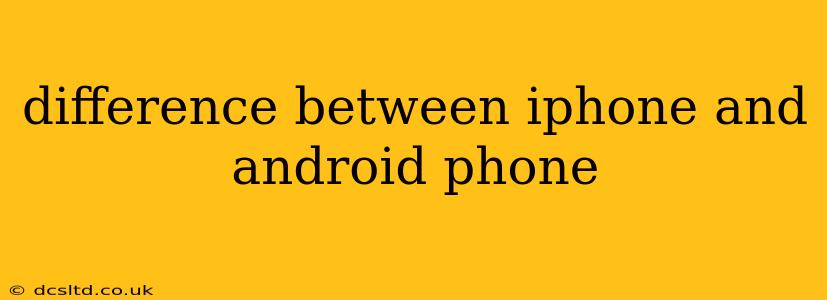Choosing between an iPhone and an Android phone is a common dilemma. Both platforms offer a wealth of features and capabilities, but their underlying philosophies and functionalities differ significantly. This comprehensive guide will explore the key distinctions to help you make an informed decision.
Operating System: iOS vs. Android
The most fundamental difference lies in the operating system (OS). iPhones run on iOS, developed by Apple, while Android devices utilize the Android OS, developed by Google. iOS is known for its simplicity and user-friendly interface, while Android offers greater customization and flexibility.
-
iOS: iOS boasts a clean, intuitive interface, with a consistent user experience across all Apple devices. Its simplicity is a major selling point for many users, particularly those new to smartphones. Updates are rolled out simultaneously to all compatible devices, ensuring everyone enjoys the latest features and security patches.
-
Android: Android offers a more open and customizable experience. Different manufacturers (Samsung, Google, OnePlus, etc.) personalize the Android interface, leading to a wider variety of looks and feels. This flexibility allows for greater personalization, but can also result in inconsistencies across devices. Update schedules vary depending on the manufacturer and device model.
App Ecosystem: App Store vs. Google Play Store
Both platforms boast vast app stores, but their approaches differ:
-
App Store: The App Store is known for its rigorous app review process, leading to a generally higher quality and safer app ecosystem. However, this strict curation can sometimes limit the availability of certain apps or types of apps compared to the Google Play Store.
-
Google Play Store: The Google Play Store offers a wider variety of apps, including those that might not meet the App Store's strict guidelines. This broader selection comes with the trade-off of potentially encountering more malware or lower-quality apps.
Hardware and Design: A Tale of Two Approaches
Apple designs its own hardware and software, creating a tightly integrated ecosystem. Android devices, on the other hand, are manufactured by numerous companies, leading to a greater diversity in hardware designs and specifications.
-
iPhones: Typically feature a premium build quality, sleek designs, and a focus on user experience. The hardware and software are seamlessly integrated, resulting in a smooth and cohesive experience. Apple controls the entire process, leading to consistent performance and timely updates.
-
Android Phones: Offer a much wider range of price points, designs, and features. You can find everything from budget-friendly devices to high-end flagships with cutting-edge technology. This variety allows consumers to find a phone that perfectly fits their needs and budget, but it can also mean inconsistent build quality and update schedules across different manufacturers.
Price: A Significant Factor
Generally, iPhones tend to be positioned at the higher end of the price spectrum, while Android phones offer a broader range of price points, including many budget-friendly options.
What are the differences in the features of iPhone and Android phones?
Feature differences span camera capabilities (processing, AI features), screen technology (OLED vs. LCD, refresh rates), processing power (chipsets), battery life, and available accessories. The specific features available will vary greatly depending on the individual model of iPhone or Android phone being compared.
Which phone is better for gaming?
The best phone for gaming depends on the specific games and individual preferences. High-end models from both platforms offer excellent gaming experiences, with powerful processors and high refresh rate displays.
What are the pros and cons of each operating system?
iOS Pros: User-friendly interface, strong security, consistent updates, high-quality apps. iOS Cons: Less customization, limited app selection compared to Android, generally higher prices.
Android Pros: Greater customization, wider range of price points and features, larger app selection. Android Cons: Inconsistent updates across manufacturers, potential for lower-quality apps, interface can be less intuitive for some users.
Which phone is better for security and privacy?
Both platforms offer strong security features, but Apple's tight control over its ecosystem arguably provides a more streamlined and secure experience out of the box. However, both Android and iOS are constantly evolving their security measures.
Ultimately, the best phone for you depends on your individual needs, preferences, and budget. Consider your priorities and weigh the pros and cons of each platform carefully before making your decision.
